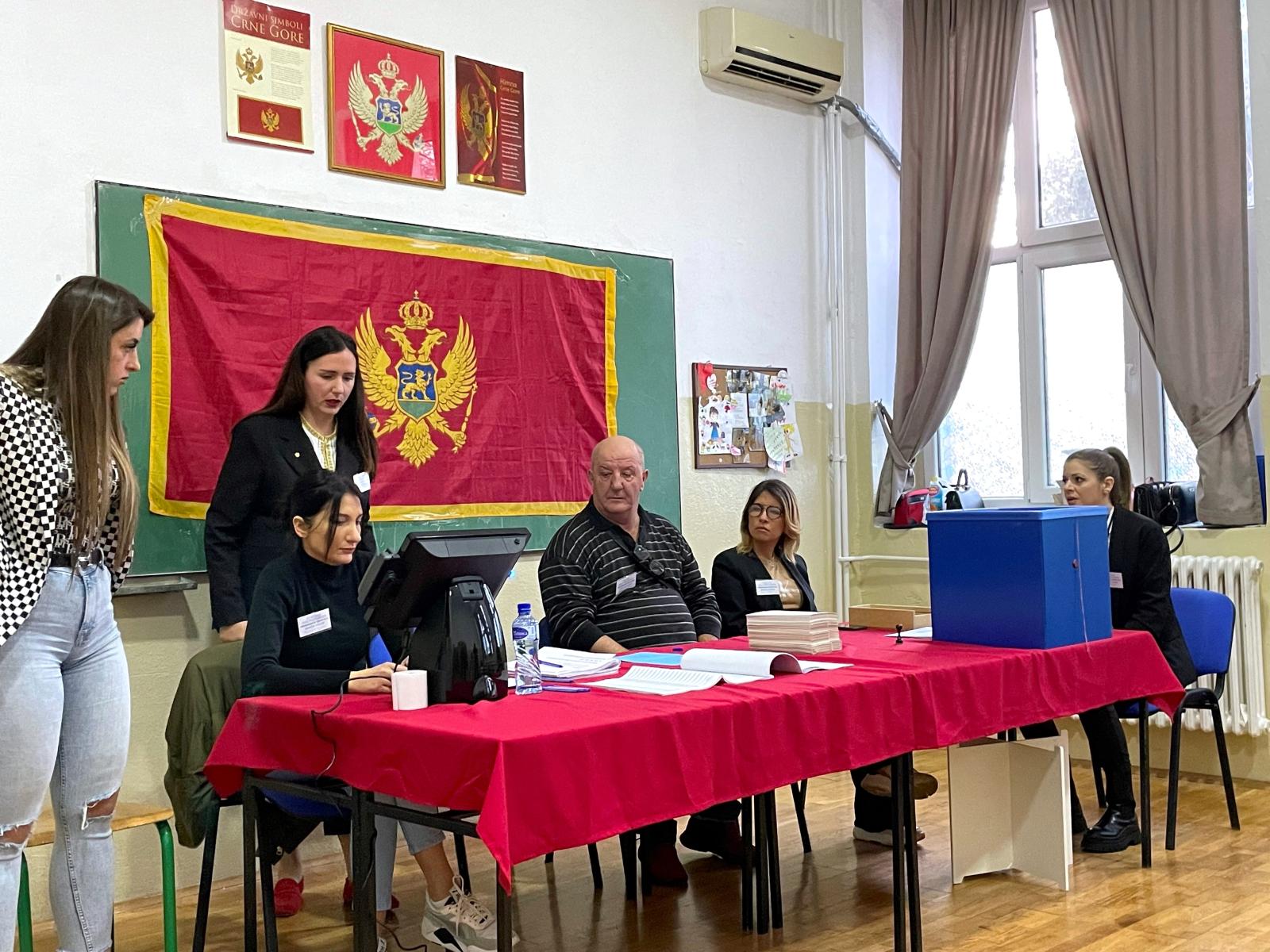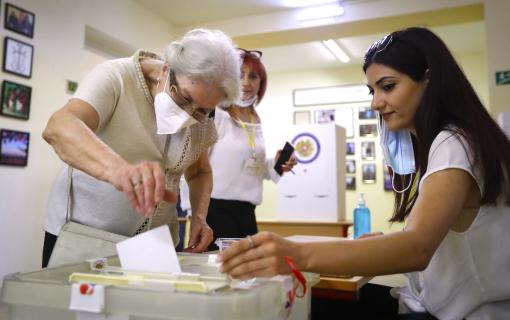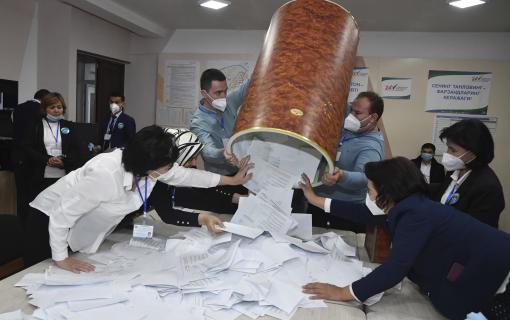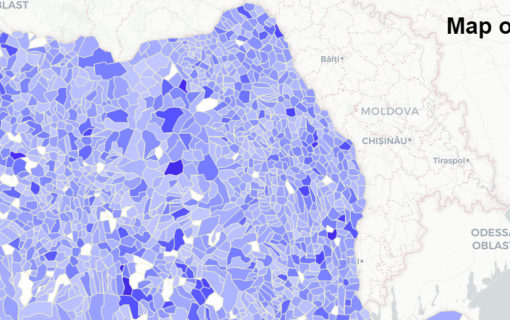Elections in Montenegro: 2023 Parliamentary Elections
On Sunday, June 11, citizens of Montenegro will vote for 81 representatives in its nationwide snap parliamentary elections.
These elections come close on the heels of a historic presidential election in which political newcomer Jakov Milatović defeated President Milo Đukanović, ousting the Democratic Party of Socialists from the presidency for the first time in decades. On March 16, three days before the first round of the presidential election, Đukanović dissolved Parliament and scheduled early parliamentary elections, citing ongoing turmoil within the government and a lack of progress toward European Union accession.
Ahead of this important electoral process, the International Foundation for Electoral Systems (IFES) provides Frequently Asked Questions (FAQs) on Elections in Montenegro: 2023 Snap Parliamentary Elections.
Learn more about IFES's programs in Montenegro and follow @IFES_Europe and @IFES1987 on Twitter.
Additionally, visit IFES's Election Guide for the most comprehensive and timely verified election information available online.
Frequently Asked Questions (FAQs)
Montenegro will hold nationwide snap parliamentary elections on June 11, 2023. Voting will take place from 7 a.m. to 8 p.m. in 1,159 polling stations across the country; no provisions exist for out-of-country voting. Voters in custody or serving a prison sentence may vote at a special polling station as determined by the administrative body in charge of criminal sanction enforcement. Voters who cannot go to their designated polling place due to age, disability, or medical treatment may apply to am.
Montenegro’s 2023 snap parliamentary elections come close on the heels of a historic presidential election in which newcomer Europe Now’s Jakov Milatović defeated President Milo Đukanović, ousting the Democratic Party of Socialists (DPS) from the presidency for the first time in decades. On March 16, three days before the first round of the presidential election, Đukanović dissolved Parliament and scheduled early parliamentary elections, citing ongoing turmoil within the government and a lack of progress toward European Union accession.
In the most recent parliamentary elections, in 2020, the DPS lost its longstanding majority. Since then, Montenegro’s Parliament has wrestled with multiple votes of no confidence that have contributed to political turmoil in the country. One of those votes resulted in the collapse of the ruling coalition under Prime Minister Zdravko Krivokapić and the appointment of a new government under Dritan Abazović, who subsequently also lost a vote of no confidence in August 2022 and has remained in power on a caretaker basis since. The Constitutional Court, the country’s highest legal body, was left without a quorum from September 2022 to February 2023, delaying the finalization of the 2022 local elections. The prolonged period of the court’s inactivity and turmoil within Parliament raised concerns among EU leaders, who point to problems within the judiciary and Parliament’s failure to enact substantial anti-corruption measures as hindering the country’s progress toward joining the EU.
Fifteen candidate lists, comprising 1,113 candidates, have been put forward by parties, coalitions, and citizen groups: The People’s Coalition—Complex and Point; Albanian Alliance; SNP—Demos—For You; Europe Now—Milojko Spajić; For the Future of Montenegro; Aleksa and Dritan—Bravery Counts!; It’s clear! Bosniak Party—Mr Ervin Ibrahimović; lbanian Forum—Nik Gjeloshaj “BESA For European Development;” Forward! For the future that belongs to you—Danijel Živković; SDP—For Our House; HGI—On the right side of the world; Yes, we can for citizens of Montenegro!; Return to a Safe Montenegro—Srđan Perić; Movement for change—Montenegro first—Nebojša Medojević—Reforms to save the country; and Justice for All!.
Montenegro’s 81 parliamentary representatives are elected on a proportional representation basis to a single nationwide constituency from closed party lists. The term of office is four years, barring the premature dissolution of Parliament and early elections. Lists, including those put forward by coalitions, must receive 3 percent of the national vote to gain seats in Parliament. However, this threshold does not apply to national minority lists, for which the threshold is 0.7 percent of the national vote. The number of representatives is determined by population, with one member of Parliament for every 6,000 registered voters.
Montenegro’s parliamentary elections are regulated by the Constitution, the 1998 Law on the Election of Councilors and Members of Parliament, and the 2020 Law on the Financing of Political Entities and Campaigns. These laws are augmented by decisions and procedures adopted by the State Election Commission.
There has been significant pressure for electoral reform, both domestically and from international bodies such as the European Commission and the Organization for Security and Co-operation in Europe’s Office for Democratic Institutions and Human Rights (OSCE/ODIHR). The recommended changes would cover gaps in the regulation of campaign finance and the role of the media in elections, but parliamentary gridlock and polarization have slowed progress in implementing reforms. An ad-hoc parliamentary Committee for Comprehensive Reform of Electoral and Other Legislation was established in 2018 and reconvened in 2021; however, it held just two meetings throughout 2022 and has yet to propose reform legislation for Parliament’s consideration. Consequently, many of the recommendations for reform from the EU and OSCE/ODIHR remain unaddressed. These include a comprehensive review and harmonization of the legislation, restrictions on voter and candidacy rights, measures against the misuse of state resources, transparency of campaign finance, media and dispute resolution regulations, and measures to enhance the participation of women in both political and public life.
Any citizen at least 18 years old, has legal capacity, and has been a permanent resident of Montenegro for at least two years before Election Day is eligible to run for parliament.
Registered political parties—individually or as coalitions—and groups of voters can propose candidates in a candidate list as long as submitted lists receive a number of signatures equal to 0.8 percent of voters based on the number of voters in the most recent presidential or parliamentary elections. For these parliamentary elections, based on the number of voters in this year’s presidential elections, the threshold is 4,338 signatures. Candidate lists for political parties or groups representing national minority communities must submit at least 1,000 signatures, while candidates representing a minority making up 2 percent or less of the population must submit at least 300 signatures. These numbers are set in Montenegrin electoral law and are not based on the number of voters in the most recent election.
Candidate lists must be proposed to the State Election Commission (SEC) no earlier than 20 days after the calling of the election (by April 5 for the upcoming election) and no later than 25 days before Election Day (by May 16). The SEC reviews the list upon receipt and ensures it was submitted following all deadlines, quotas, and regulations. If a list fails to meet SEC regulations, the entity will receive an order to amend it within 48 hours of the order’s receipt.
Montenegrin electoral law stipulates that at least 30 percent of candidates on each list must be “from the underrepresented sex” and further requires that, for every four candidates in the candidate list order, at least one must be a member of the underrepresented sex (that is, at least one from the first four places, at least one from the second four places, and so forth). If a list is submitted that does not fulfill these requirements, the State Election Commission (SEC) will allow the submitting entity an opportunity to amend the list; failure to do so will result in the SEC refusing to publish the list.
Voters with disabilities or who are illiterate are eligible to vote with the assistance of a designated individual chosen by, and in the manner instructed by, the voter. Voters who are blind or have poor vision can receive a tactile ballot guide from their polling station. Voters with disabilities, elderly voters, or voters receiving medical treatment may apply to their Polling Board to vote by mobile ballot team. If the application is approved, a team from the voter’s polling station will deliver an envelope with a ballot to the individual’s home, where they can cast a ballot privately. The application is due by 1 p.m. on Election Day to the designated polling station, which is determined by the individual’s place of residence. An individual may submit the application on behalf of the voter.
Campaign finance is regulated mainly by the Law on Financing Political Entities and Election Campaigns. The National Audit Office and the Agency for the Prevention of Corruption monitor, track, and enforce campaign finance regulations.
Individuals may donate up to €5,000 (or approximately $5,487) to political parties or coalitions; legal entities may donate up to €20,000 (or approximately $21,949). Donations from foreign, anonymous, state-funded, non-governmental, or religious organizations or sources are prohibited. Parliamentary parties are also entitled to public funding annually and in allocations throughout the election campaign period. During the campaign period, 20 percent of funds disbursed must be distributed equally among all political entities contesting the election within eight days of the deadline for submission of lists; the remaining 80 percent must be distributed to parties represented in Parliament in proportion to the number of seats awarded. Expenditures are limited to €3.2 million (about $3,418,752) for each contestant in the election.
Montenegro’s national election management body (EMB) is the State Election Commission (SEC), which consists of 10 permanent members, a chairperson, and one representative from each accepted candidate list. The composition of the SEC’s permanent members is set at four members from the parliamentary majority (in addition to the chairperson), four from the opposition, one from civil society (with familiarity with electoral legislation), and one from the minority party that received the most votes in the most recent election. Persons who served as a political party body member within the preceding 10 years may not be appointed to the SEC. As the country’s national EMB, the SEC coordinates Municipal Election Commissions (MECs), oversees election materials, reviews and publishes official candidate lists, and ascertains and certifies election results.
MECs, like the SEC, are permanent bodies. Each MEC consists of a chairperson and four members, with two (in addition to the chairperson) from the parliamentary majority and one empowered representative of each candidate list. MECs are responsible for technical election preparations, designating polling stations, and forming Polling Boards (PBs).
One PB will be convened for each of the country’s 1,159 polling stations. Each PB comprises a chairperson, four members, and one empowered representative of each candidate list. PBs are responsible for directly administering voting at their stations per instructions from the SEC in preparation for the election, including conducting vote count on Election Day.
Any citizen at least 18 years old and a permanent resident of Montenegro for at least two years prior to Election Day has the right to vote in parliamentary elections. As of May 30, 543,175 Montenegrins were registered to vote in the upcoming election. Out-of-country voting is prohibited under Montenegrin law, and citizens who live abroad permanently must return to the designated polling station for their most recent address in Montenegro to vote. The Ministry of the Interior maintains a permanent, centralized register that is updated automatically based on information from three civil databases that track citizenship, residence, and births and deaths. Voters may electronically confirm their information in the registry or call a dedicated hotline and request changes or corrections before Election Day.
The Law on Election of Councilors and Members of Parliament permits domestic non-governmental organizations (NGOs) and international bodies to observe all stages of the election process. Foreign observers must submit an application for election observation to the ministry in charge of external affairs no more than 10 days before the election or by June 1, 2023. Domestic NGOs interested in monitoring the election must submit applications no more than five days before the election or by June 6. The ministry shares all applications received with the State Election Commission (SEC) for evaluation, and the SEC approves or rejects applications for observation within 48 hours of the ministry sharing them.
The Law on the Election of Councilors and Members of Parliament sets a timeline for reporting votes. Each polling station must submit vote counts to the appropriate Municipal Election Commission (MEC) within six hours of polls closing or by 2 a.m. on June 12; the MEC, in turn, must submit certified vote counts to the State Election Commission (SEC) within 12 hours of the submittal of counts from polling stations, or by 2 p.m. on June 12. The SEC then has 12 hours, or until 2 a.m. on June 13, to ascertain the preliminary results of the elections and determine the allocation of seats.
Final results must be confirmed within 12 hours after the deadline for election complaints and disputes to be lodged, as described in the following section. These results and final seat allocations must be published in the Official Gazette of Montenegro no more than 15 days after Election Day.
Complaints may be filed by voters and candidates to the responsible election management body, with the Constitutional Court as the final appellate instance. By law, complainants have 72 hours from the time of the grievance to submit complaints to the relevant Municipal Election Commission (MEC) or the State Election Commission (SEC). MECs and the SEC have 24 hours to decide or submit to the SEC or Constitutional Court, respectively. If the complaint is addressed to a MEC and rejected, the complainant may then appeal to the SEC; if the SEC upholds the MEC’s decision, or if the complaint originated with the SEC, the decision may be appealed to the Constitutional Court, which has 48 hours to consider the appeal. According to the SEC, these deadlines are short and pose challenges when there is a high caseload and several complaints need to be considered concurrently, including on election results.
- Constitution of Montenegro (adopted 2007, revised 2013)
- State Electoral Commission of Montenegro
- Law on the Election of Councilors and Members of Parliament
- Law on the Financing of Political Entities and Election Campaigns
- Montenegro 2023 Presidential Election: IFES Election Snapshot
- Organization for Security and Co-operation in Europe’s Office for Democratic Institutions and Human Rights (OSCE/ODIHR) Election Observation Mission Interim Report
The International Foundation for Electoral Systems (IFES) has worked closely with electoral stakeholders to strengthen the electoral process in Montenegro, focusing on anti-corruption, electoral reform, and civic education. IFES’s work has engaged with the State Election Commission, the Agency for Prevention of Corruption, and other government institutions, as well as with domestic organizations such as the Center for Monitoring and Research, with which IFES partnered in the leadup to the 2020 parliamentary elections to develop anti-corruption measures and expand election monitoring capacity. In 2023, IFES launched a new program, Countering Hostile Interference in the Electoral Process in Montenegro, to assess threats posed by malign interference in Montenegro’s electoral process and to propose tailored interventions to address those threats.
These FAQs reflect decisions made by the State Election Commission as of June 6, 2023, to the best of our knowledge. This document does not represent any International Foundation for Electoral Systems policy or technical recommendations.










